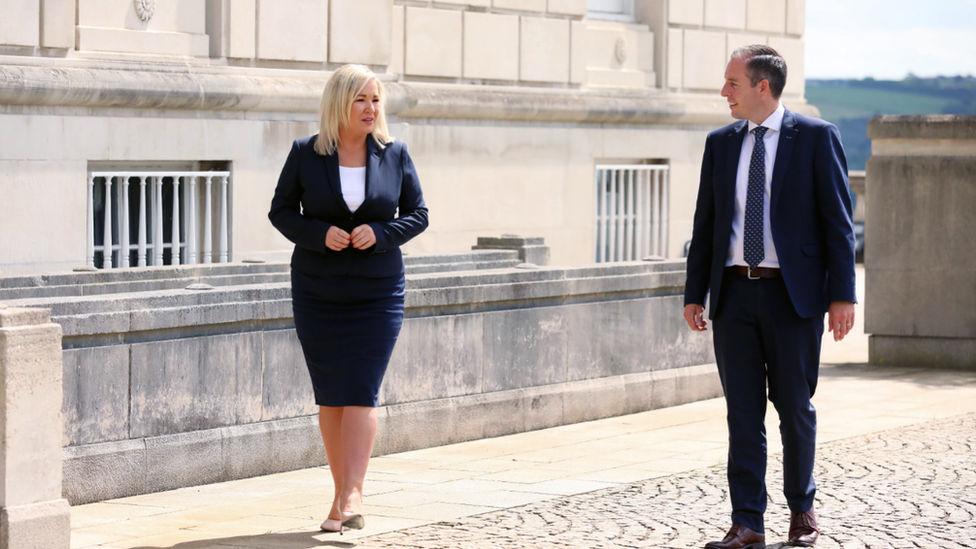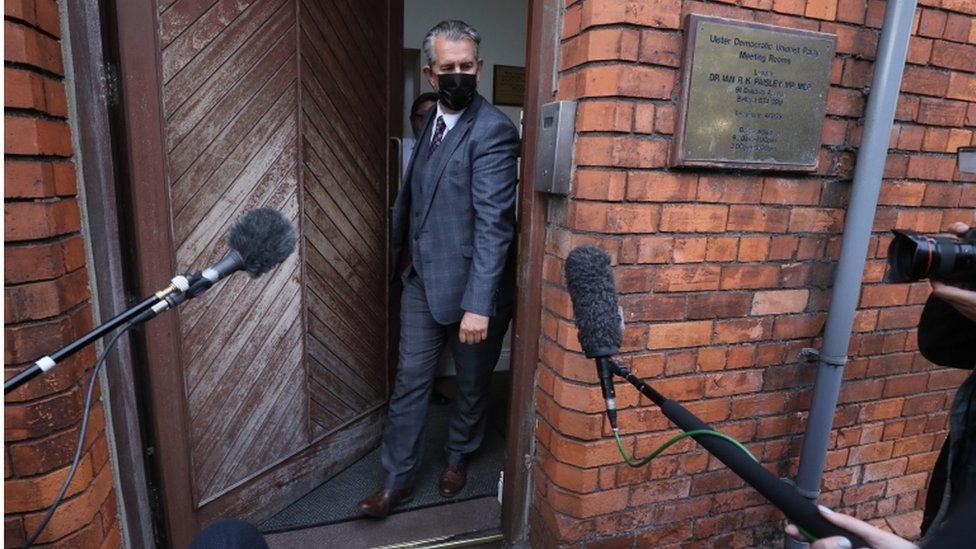DUP: Paul Givan told he must resign as first minister
- Published

Paul Givan is Northern Ireland's youngest first minister
The Democratic Unionist Party's Paul Givan has been told that he will have to resign as Northern Ireland's first minister when a new party leader takes over.
It comes just days after Mr Givan was officially installed in the post.
DUP party officers have set a date of 26 June to elect a new leader, with only MLAs and MPs entitled to vote.
The nomination process has now opened, and will remain so until noon on 22 June.
Mr Givan was informed that he would have to step down by DUP officers after Edwin Poots resigned as party leader.
The story was first reported by the Belfast Telegraph, external.
Mr Poots stepped down on Thursday after an internal party revolt over his decision to agree a deal with Sinn Féin and nominate Mr Givan as first minister.
Potential new leaders must submit in writing their nomination, supported by a proposer and seconder, to DUP chairman Lord Morrow, external.
Mr Givan is Northern Ireland's youngest first minister and looks set to be the shortest serving leader to hold the post.
Sir Jeffrey Donaldson, who is favourite to be the next DUP leader, has made it clear he plans to lead the party from Stormont as first minister.
The Lagan Valley MP ran against Mr Poots for the leadership and was narrowly defeated in the wake of Arlene Foster's ousting.

Mr Poots took over as DUP leader in May
When Mr Givan resigns, it once more will see Michelle O'Neill removed as deputy first minister and the DUP and Sinn Féin will then have seven days to fill the roles.
Mr Poots, who took over as leader in May amid internal tensions about the direction of his leadership and the manner of Mrs Foster's departure, announced his resignation after a meeting of DUP party officers on Thursday night.
The BBC understands a motion of no confidence was mentioned at the meeting, but not tabled.
'Other parties responsible'
Speaking to Irish national broadcaster RTÉ, Irish Minister for Foreign Affairs Simon Coveney said that the DUP has "had a terrible number of weeks".
"I think they will now look to putting a new leader in place quickly and to provide stability behind that person and we need to give them the space and time to do that," he said.
"I also think other parties in the executive will be responsible in terms of trying to get that new first minister in place, if there is a new first minister, or if Paul Givan remains in office."


DUP officers have decided that Paul Givan can't remain in place after a new party leader takes over.
But it's not clear yet when that will happen.
It is a huge blow for the Poots and Givan partnership.
Last week they were at the peak of their respective political careers but it all unravelled within days.
And once Mr Poots announced his plan to resign after being told by party officials he had lost his support, Mr Givan's fate was sealed.
To quote Mr Poots they, like Arlene Foster, have now felt "the rough and tumble of politics".

Prof Jon Tonge, of Liverpool University, who has written a book about the DUP, said the problems "will be exactly the same for the new first minister, because Sinn Féin's demands for Irish language provision, in line with New Decade, New Approach, are going to be exactly the same.
"So the party, this time, is going to have to be squared off before that nomination for first minister can be made."
This latest issue was sparked after a late-night deal was done between Sinn Féin, the DUP and Secretary of State Brandon Lewis ending a stalemate over Irish language laws to allow for the nomination of a new first minister.
The position had become vacant after Mrs Foster formally resigned on Monday, thereby also triggering the resignation of Sinn Féin Deputy First Minister Michelle O'Neill, as it is a joint office.
Mr Poots had named Mr Givan as the DUP's pick to replace Mrs Foster, while Sinn Féin said Ms O'Neill would resume her post as deputy first minister.
But Sinn Féin had wanted commitments from the DUP over a timetable for implementing Irish language legislation, as set out in the New Decade, New Approach, external (NDNA) deal that restored power sharing in January 2020.
The party said this was not forthcoming, and it called on Mr Lewis to bring in Irish language legislation via Westminster.

Paul Givan and Michelle O'Neill were confirmed as first and deputy first ministers last Thursday
Mr Poots had said he was committed to implementing all of the NDNA commitments, including those around Irish language, but not necessarily before the end of the current assembly mandate in May 2022.
A deal was then struck between the two parties and the secretary of state in the early hours of Thursday morning that would see Westminster legislate for Irish language commitments in October, if Stormont fails to do so beforehand.
DUP MPs and peers wrote to Mr Poots expressing concern about the deal, ahead of a DUP assembly group meeting which it is understood saw the vast majority of DUP MLAs - 24 to four - oppose Mr Poots nominating Mr Givan as first minister as a result of the deal.
However, Mr Poots and Mr Givan left the meeting early, ahead of a special sitting of the assembly which then confirmed Mr Givan and Ms O'Neill as first and deputy first ministers.
- Published23 June 2021
- Published18 June 2021

- Published17 June 2021
